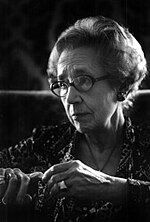Lydia Cabrera
 Lydia Cabrera (May 20, 1899, in Havana, Cuba – September 19, 1991, in Miami, Florida) was a Cuban independent ethnographer, writer, and literary activist. She was an authority on Santería and other Afro-Cuban religions. During her lifetime she published over one hundred books; little of her work is available in English. Her most important book is ''El Monte'' (Spanish: "The Wilderness"), which was the first major ethnographic study of Afro-Cuban traditions, herbalism and religion. First published in 1954, the book became a "textbook" for those who practice Lukumi (orisha religion originating from the Yoruba and neighboring ethnic groups) and Palo Monte (a central African faith) both religions reaching the Caribbean through enslaved Africans. Her papers and research materials were donated to the Cuban Heritage Collection - the largest repository of materials on or about Cuba located outside of Cuba - forming part of the library of the University of Miami. A section in Guillermo Cabrera Infante's book ''Tres Tigres Tristes'' is written under Lydia Cabrera's name, in a comical rendition of her literary voice. She was one of the first writers to recognize and sensitively publish on the richness of Afro-Cuban culture and religion. She made valuable contributions in the areas of literature, anthropology, art, ethnomusicology, and ethnology.
Lydia Cabrera (May 20, 1899, in Havana, Cuba – September 19, 1991, in Miami, Florida) was a Cuban independent ethnographer, writer, and literary activist. She was an authority on Santería and other Afro-Cuban religions. During her lifetime she published over one hundred books; little of her work is available in English. Her most important book is ''El Monte'' (Spanish: "The Wilderness"), which was the first major ethnographic study of Afro-Cuban traditions, herbalism and religion. First published in 1954, the book became a "textbook" for those who practice Lukumi (orisha religion originating from the Yoruba and neighboring ethnic groups) and Palo Monte (a central African faith) both religions reaching the Caribbean through enslaved Africans. Her papers and research materials were donated to the Cuban Heritage Collection - the largest repository of materials on or about Cuba located outside of Cuba - forming part of the library of the University of Miami. A section in Guillermo Cabrera Infante's book ''Tres Tigres Tristes'' is written under Lydia Cabrera's name, in a comical rendition of her literary voice. She was one of the first writers to recognize and sensitively publish on the richness of Afro-Cuban culture and religion. She made valuable contributions in the areas of literature, anthropology, art, ethnomusicology, and ethnology.In El Monte, Cabrera fully described the major Afro-Cuban religions: Regla de Ocha (commonly known as Santeria) and Ifá, which are both derived from traditional Yoruba religion; and Palo Monte, which originated in Central Africa. Both the literary and anthropological perspectives in Cabrera's work assume that she wrote about mainly oral, practical religions with only an “embryonic” written tradition. She is credited by literary critics for having transformed Afro-Cuban oral narratives into literature, which is, written works of art, while anthropologists rely on her accounts of oral information collected during interviews with santeros, babalawos, and paleros, and on her descriptions of religious ceremonies. There is a dialectical relationship between Afro-Cuban religious writing and Cabrera's work; she used a religious writing tradition that has now internalized her own ethnography. Provided by Wikipedia